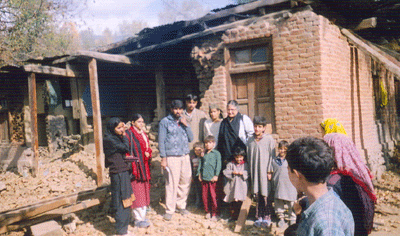 People's Democracy
People's Democracy
(Weekly
Organ of the Communist Party of India (Marxist)
No. 46
November 13, 2005
(Weekly
Organ of the Communist Party of India (Marxist)
|
Vol.
XXIX
No. 46 November 13, 2005 |
J&K EARTHQUAKE RELIEF
AIDWA Team Stresses Need For Long Term Rehabilitation Measures

AIDWA team members with affected people in a remote village in Uri
“The tragic reports of people’s lives wrecked by the earthquake in Kashmir, especially in Uri and Tanghdhar, underline the need for sustained relief and rehabilitation efforts not only by government agencies, but all sections of society. The extent of the damage is so extensive that the state administration, the army, and all organisations will have to coordinate efforts to achieve any impact on the ground. Rehabilitation and reconstruction processes have been set in motion by the government with the backup provided by the army, and with help from voluntary organisations. However, the inhospitable terrain and security issues are hampering these efforts, particularly since militant activity is very high in these regions. Indeed, there is need for vigilance and monitoring so that the money sanctioned does actually reach the people it is meant for.”
THIS was the opinion of a team of the All India Democratic Women’s Association (AIDWA) leaders that visited Kashmir during November 2-4, 2005. AIDWA general secretary, Sudha Sundararaman, Sehba Farooqi, and Shabqat (from Handwara district) carried with them a sum of Rs 2.25 lakh, the first installment of funds collected by the organsiation for the earthquake stricken people of Kashmir. The two truckloads of materials, including blankets, warm clothes, and consumables that had been sent by AIDWA had already reached the affected people, and also been distributed. However, the condition of the people had worsened so much that any vehicles carrying relief materials were being hijacked on the way, and this was resulting in further discrimination against those in far flung areas. In fact, on the day of Ramzan festival when the newly appointed Congress chief minister, Ghulam Nabi Azad went to distribute materials in Teetwal village, the convoy was mobbed by desperate people. The administration will have to work out ways of addressing this serious problem, felt the AIDWA team in its report.
The report further states:
“There has been a rush of aid into Uri and Tangdhar; of course the problems of equitable distribution and the gap between the need and supply are acute and persistent. Some areas beyond Uri are still proving inaccessible as roads have been totally destroyed. The team visited a few villages in Kupwara, Handwara and Baramullah districts where they were able to gain first hand information about areas that have not suffered from such devastation as Uri and Tangdhar but nevertheless where many families have lost their homes and belongings.
“In Kupwara, a survey by a fraternal organisation, the Democratic Youth Federation of India (DYFI) indicates that there are 20 villages (Radbugha, Ahgam, Khandi, Panjava, Raawatpura, and Rahmahal, to name a few) where the quake has led to house collapses. The appeal from the people of these villages has not yet reached the ears of the administration, whose attention is focused on the badly-hit regions. But those families whose houses have collapsed are faced with the grim threat of winter snow, which may fall any moment. In Radbugha, the team saw many houses that had collapsed; others had huge cracks. There were some brick facades that appeared intact from outside, but when we entered the house we found that the inner walls were in ruins. One house had its ground floor intact, but the two upper storeys had completely fallen down. These were very poor families with no refuge. The flimsy makeshift arrangements that they had put up could, by no stretch of the imagination, have protected them from the cold. No tents or any other forms of support have reached these villages yet.
“The plight of the children and the sick, particularly of older women is pathetic. It has been decided that Shabqat will prepare a full survey report along with the youth group, and submit it to the authorities in charge of the relief efforts. AIDWA will follow up to ensure that relief also reaches these areas.”
The discussions with Shabnam who has been working along with many concerned
groups to reach out to the affected people, revealed that orphaned children,
destitute women, and the disabled are in particularly dire straits. She
highlighted the importance of long term rehabilitation efforts so that the
education of children and the economic support required by women for income
generation activities can be facilitated over a longer period of time.
The report concludes thus:
“Extended and sustained support of this kind is an important component of relief and rehabilitation. For many, such long term help will make a crucial difference. This requires much larger amounts than what AIDWA has already collected and disbursed. To be concretely involved in assisting families to get back on to their feet and to enable children to pursue their education, AIDWA has pledged to raise more resources.
The issue of strengthening our relief efforts in Kashmir has to be seen in a special context. This is a moment of distress for a state which is plagued by militancy, and terrorist attacks, in which civilians as well as military personnel and even ministers are under constant threat. The women of Kashmir also feel insecure because of the constant presence of the Indian Army, and the frequent searches that they are subject to. (Our vehicle was stopped and searched four times the day we visited Kupwara!) There is a need to extend all help to our brothers and sisters now, so that the people of Kashmir feel reassured that they are not alone. Let us all come forward to reassert this message of solidarity, at this crucial moment.”